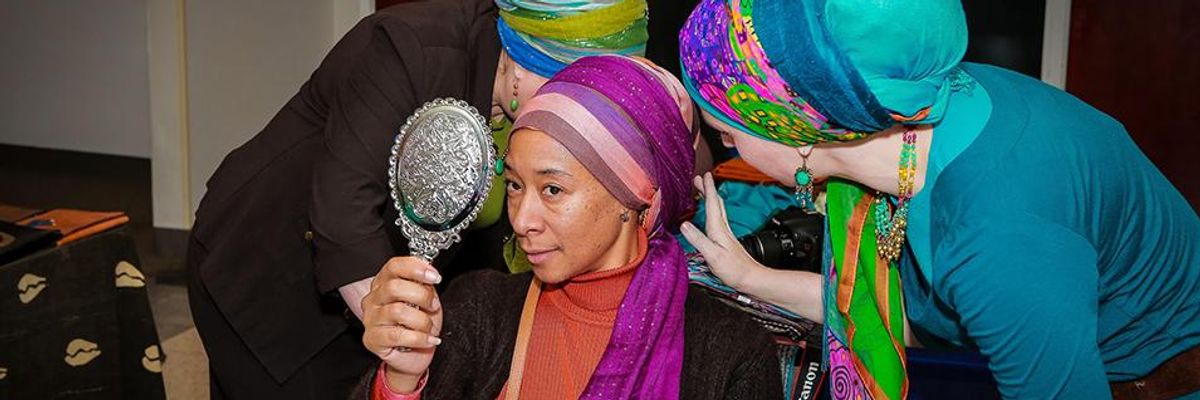In cultures around the world, women wrap their hair and their heads. The practice is found in Native American, Japanese, Turkish, Eastern European, Bengali, Filipino, Jewish, Muslim, Christian, Catholic, and Sikh customs--among many more. African-Americans have long wrapped their hair (respect, Nina Simone and Aretha Franklin). Even in the United States, white women and men both covered their heads in polite society well into the 20th century.
But somewhere along the way, the idea of covering the head became associated with oppression. Never mind that women around the world--including Christian women--cover their heads. After all, in the New Testament of the Bible, 1 Corinthians 11:6 says, "For if a woman does not cover her head, she might as well have her hair cut off; but if it is a disgrace for a woman to have her hair cut off or her head shaved, then she should cover her head."
Enter the Headwrap Expo-Globalize Your Mind event, held this month in Dearborn, Michigan. It's an annual celebration of self-discovery, leadership, and traditions from all over the world. With informative experts, demonstrations, and deep conversations, the event dissolves stereotypes around the tradition of covering the head, and fosters an environment where everyone is able to learn something new--from fabrics to scarf-wrapping techniques to the history of different cultures, countries, and traditions, fostering connections and uplifting the mind.
A cultural anthropologist, Headwrap Expo organizer Zarinah El-Amin Naeem saw headwraps as a tool to study different cultures and bring people together. Headwrapping, she says, is "found within so many cultures of the world. The expo was started to connect all the different groups that utilize headwrapping. It wasn't about the headwrap--it was about the connection."
Founded in 2013, the expo has grown into a three-day event that inspires women of all backgrounds, nationalities, and faiths to get out of their comfort zone and safely explore other perspectives--an opportunity to build on global citizenship.
Many women have dreams of doing something unconventional, says El-Amin Naeem. But, "they'll push it aside." A lot of women say, "I could never do that," she adds. "You can," is her response. By thinking outside the box, they can "slowly open to other realities."
It starts with figuring out creative solutions to incorporating new ideas into their lives, she says.
As might be expected, there was pushback from some on the idea of the event. "They thought it should be a black event, or an African event," says El-Amin Naeem. That hyper-focus would miss the point of the expo: It's about diversity.
El-Amin Naeem is intentional in every aspect of bringing together women of varied backgrounds, striving to "be intentional about diversity in models, their weight, age, and ethnic backgrounds. The event is a multicultural, interfaith production, with the goal of building understanding between the groups."
People attended and shared their culture and traditions from Bangladesh, India, Nigeria, Japan, Bulgaria, India, Bermuda, Detroit, and Tennessee, among many other places. There were Orthodox Christians, Sikhs, Orthodox Jews, and Muslims, who all shared their traditions and ideas with each other. The headwrap was the tool of connection, and the vibe was one of harmony--even when one attendee had a hijab put on, by Orthodox Jews.
To El-Amin Naeem, the expo has presented the opportunity to "have a deeper conversation," about issues of acceptance and society. It's a space, she says, where people get intrigued by other cultures,"an intimate setting to unpack the cultural wombs that made us into who we are, to unpack and peel back the layers of where we are at today, and look at that as a way to propel us into our future."
El-Amin Naeem is facilitating "deep introspective work on ourselves and the world, exploring... the lived experience [of] life."
"What is important to you for your own legacy?" became one of the questions explored, especially in relationship to traditions that are getting harder and harder to maintain in the modern Western world.
The headscarf, says El-Amin Naeem, is a personal choice, whether spiritual, cultural, practical or fashionable. In many cultures, the practice of covering the head pre-dates the religions that adopted and directed it. The headscarf was, and frankly, continues to be, a practical way to keep hair clean.
"No one group owns it. You decide for yourself," El-Amin Naeem says, encouraging people to explore options and reminding them to recognize the history of what they're wearing and why they are doing it.
She encourages all people to "speak with someone different from yourself, learn from others. Ask who are they and why they wear the scarf."
The way to curb ignorance is through education, and asking that simple question politely, and events like the Headwrap Expo, can go a long way to fostering understanding.
So does looking at what you want--that seemingly big thing you tell yourself you can't do--and seeing what part of it you can start incorporating in your life, whether it's travel, fashion, or pursuing a new career, or even wearing a headscarf.
Thinking outside the box, all around, is an exercise we can all benefit from, no matter where we are or where we come from.
Learn more about headwrapping and its culture here, and about the Headwrap Expo and Globalize Your Mind at enlivenyoursoul.com. This article was produced by Local Peace Economy, a project of the Independent Media Institute.



